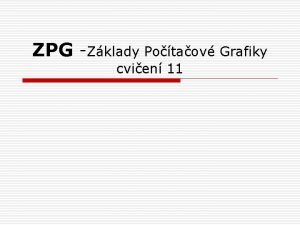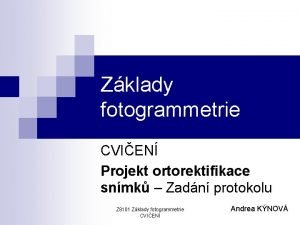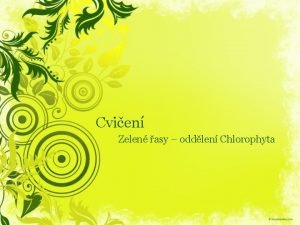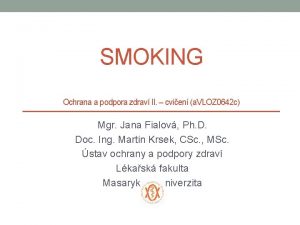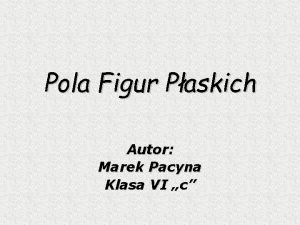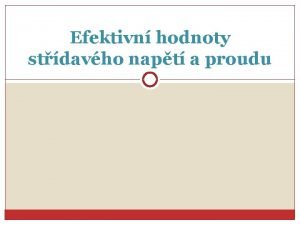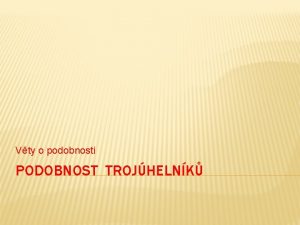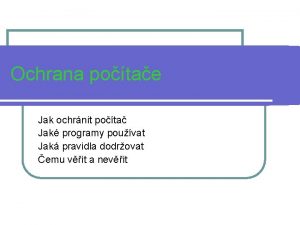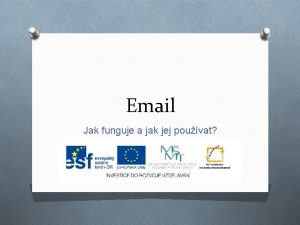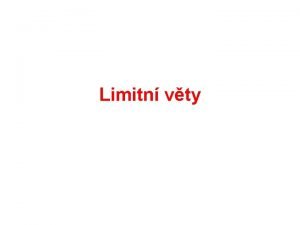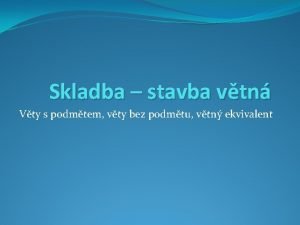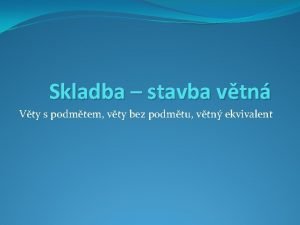Cvien 3 Zde se naute jak vty pouvat







- Slides: 7

Cvičení 3: Zde se naučíte, jaké věty používat při odpovídání na předem určené otázky

1. What care is provided to our citizens during their life time? Medical care is provided for our citizens from birth to death. Each of us is looked after even before birth under the scheme called prenatal care which includes medical check-ups before the child is born and then maternity ward services. 2. What diseases are we vaccinated against? Soon after birth each child is vaccinated against illnesses such as tuberculosis (TB), diphtheria, tetanus, whooping cough, polio and later smallpox.

3. What are considered to be children's illnesses? For children's illnesses are considered: cold, otisis, measles, mumps, rubeola or chicken-pox. 4. How can we cure a cold without going to a doctor? If we are not hypochondriacs we try to get over our cold easily by staying in bed, taking pills, keeping warm, sweating, gargling and drinking herbal tea with honey or lemon. But sometimes if a patient is trying to overcome a feverish sickness without staying in bed and curing it properly, he takes a risk, as the illness often leaves very dangerous aftereffects. 5. What does a nurse usually do before you enter a surgery? Then the nurse says "Next please" and invites us into the consulting room. The nurse has to look for our medical record and wants to see our insurance card and then takes our temperature. Then we are ready to enter the surgery (consulting room).

6. What does the doctor want us to do before and during the examination? The doctor usually asks what the trouble is and then asks us to strip to the waist because he or she must examine our chest and throat. The doctor wants to know if we have a temperature, a good appetite and where we feel pain. Then he or she listens to our lungs and heart and we have to take a deep breath or stop breathing according to his orders. He also wants us to open our mouth and say "Ah" to see if our tonsils are red. Sometimes he or she checks the blood pressure and feels the pulse, takes the bloodcount and throat culture or puts urine through lab tests. 7. What information is he interested in? We have to say how we feel, if we have a headache, a sore throat, a cold, a cough, or if we are sick and hoarse.

8. What kind of medicine can we get at the pharmacy? At the pharmacy (at the chemist's in Britain) we get antibiotics, vitamins, pain relievers and gargle. We can also buy some medicinal herbs to prepare herbal tea. 9. How are serious patient treated? Patient may be taken to hospital by an ambulance, In case of unconsciousness or heart attack the patient is put on a stretcher. For car accidents a special helicopter may be called up. Sometimes it is necessary to give first aid such as mouth-to-mouth resuscitation, to stop bleeding or fix fractures. 10. How is a patient prepared for an operation? Before the operation the patient must pass several tests and then just before the operation he is anaesthetized by means of an injection or inhalation of a narcotic.

11. What treatment often follows an operation? The patient is sometimes sent to a health resort or a spa for rehabilitations. There he undergoes water treatment, takes baths, massage, remedial excersises and drinks the waters. 12. How can everybody keep his or health? The best way to cure yourself of a disease is not to catch it, because prevention is better than cure. We can keep our health by physical training, hardening our body, through sport, regular daily routine, sufficient sleep, wholesome food and avoiding alcohol, cigarettes and stress.

THE END
